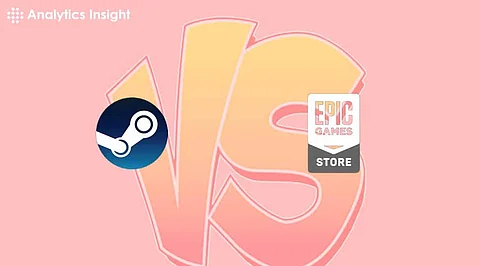

Epic Games Store has emerged as a serious rival to Steam in this modern era of digital gaming distribution. The two stores stand almost equally matched until March 2025 despite a handful of differences in the format access, user experience, pricing policy, and developer relations. To this extent, Steam has been facing it with its huge library and very loyal user base; however, Epic Games Store has recently made rapid strides through all its new exclusive titles and strong giveaways of free games.
However, which environment can bring a better experience to gamers? There is quite an insightful comparison of advantages and disadvantages of both Epic Games Store and Steam.
Steam, which Valve Corporation established in 2003, has the largest library of games among digital distribution platforms. It accommodates AAA titles, independent games, and experimental works, and as such, it’s a paradise for varied gaming experiences. Epic Games Store, which joined the market in 2018, has pursued a distinct strategy through securing exclusive publishing agreements. Titles such as Fortnite and Alan Wake 2 have also encouraged traffic to the platform, although some gamers resent the fragmentation that comes with exclusivity deals.
The usability of a game launcher has a large effect on the experience of a player. Steam offers a very feature-rich, highly customisable interface with forums, user reviews, and an in-game item marketplace. Yet, some users find its interface overwhelming and cluttered. The Epic Games Store, on the other hand, presents a minimalist, clean design that focuses on ease of use. Although this simplified approach creates a smoother experience, it does not have the sophisticated features that Steam users have grown accustomed to.
Promotion and pricing strategies are the keys to bringing users in and keeping them engaged. Steam is well known for seasonal sales with significant discounts on many thousands of games. Epic Games Store, in contrast, has grown its base by offering a free game weekly. In 2024 alone, Epic provided almost 600 million free game downloads, a practice it follows in 2025. While Steam’s model incentivises waiting for discounts, Epic’s is one that lets gamers have a large collection without paying a cent.
A good community makes the gaming experience better, and that is where Steam shines. The platform has forums, user-created content, reviews, and a solid friends system. Steam Workshop also makes modding easy for most games. The Epic Games Store, on the other hand, has been panned for not having community features. Acknowledging this deficiency, Epic announced late in 2024 that it would revamp its social features, with a view to implementing a more integrated community system after summer 2025.
The performance of a game launcher impacts gameplay, loading time, and system performance. Steam has been optimised to run smoothly, with effective usage of resources and little impact on system performance over the years. Epic’s launcher is said by some users to be slow at times, along with longer loads and the odd performance problem. Although user experience differs, it seems that Steam takes the trophy in this arena.
The aspect of revenue sharing is usually the deciding factor for a game developer to choose between the Epic Games Store and Steam. The Steam tax stands at 30 percent, with some allowances for top-selling titles; the Epic Games Store offers a far more palatable 12 percent; therefore, it is much better for developers. This very policy enabled Epic to secure some exclusives, thus driving competition between the two platforms.
Ease of access is yet another major consideration. Steam runs on Windows, macOS, and Linux, thus making it versatile enough to cater to gamers from a wide range of operating systems. The Epic Games Store caters mainly to Windows and Mac users while having only marginal support for Linux. This disparity makes Steam the go-to platform for those who need cross-platform support.
Still, the battle between Steam and the Epic Games Store does not have its end. Both have carved out their places up till now in the market. Steam occupies the top position in terms of largest games catalogue as well as community features and an extremely optimised launcher. However, according to the aggressive free-game policy, developer-friendly revenue model together with new exclusive titles, Epic Games Store has become a very competitive rival too. What matters most to the gamer will really then determine the choice. If enormous libraries, rich community interaction, and rich mod support are the most important factors in a gaming experience, Steam wins hands down. If you are collecting a library of games for free but can seriously cope with a less-than-optimal interface, then Epic Games Store is unbeatable. The competition between them will be heated further as both continue to grow, ultimately a win for gamers.
PC gaming’s future is being contested by these two platforms, and the rivalry will extend as digital gaming broadens. In this battle, one can only be sure of one thing, gamers really are the winners in this fight, whether Steam maintains its supremacy or the Epic Games Store continues to close up on it.
